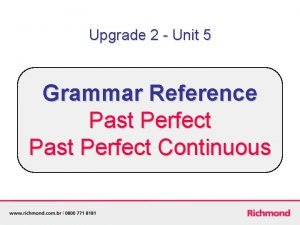Grammar glorious grammar dexteranddood co uk Perfect Form








- Slides: 8

Grammar, glorious grammar dexteranddood. co. uk Perfect Form The perfect form is the verb tense used to indicate a completed, or "perfected, " action or condition. Verbs can appear in any one of three perfect tenses: present perfect, past perfect, and future perfect. Verbs in the perfect form use a form of "have" or "had" + the past participle. (It is the form of the helping verb that indicates the tense, usually ending in ed. ) Present Perfect: I have finished flying already. Past Perfect: He had watched the action for an hour before bed Future Perfect: Dood will have finished by the time his parents return.

Grammar, glorious grammar Perfect form. . Present perfect. . Past perfect. . Future perfect. .

Grammar, glorious grammar Progressive Form The progressive form is a verb tense used to show an ongoing action in progress at some point in time. It shows an action still in progress. Verbs can appear in any one of three progressive tenses: present progressive, past progressive, and future progressive. The verbs in the progressive form use a form of "to be" + the present participle (an -ing verb). (It is the form of the helping verb that indicates the tense. ) Present Progressive: The tree is growing slowly. Past Progressive: The trees were waving back and forth. Future Progressive: The spectators will be laughing.

Grammar, glorious grammar Progressive form. . Present progressive. . Past progressive. . Future progressive. .

Grammar, glorious grammar dexteranddood. co. uk Perfect + Progressive The perfect and progressive forms can be combined, as in the following examples (again, the form of the helping verbs indicates the tense): Present Perfect Progressive: I have been running for an hour. Past Perfect Progressive: I had been running for an hour. Future Perfect Progressive: I will have been running for an hour.

Grammar, glorious grammar Perfect + Progressive form. . Present perfect progressive. . Past perfect progressive. . Future perfect progressive. .

Grammar, glorious grammar dexteranddood. co. uk We use contractions to shorten a word by removing one letter or more and substituting an apostrophe in the same spot. Can not – can’t Will not – won’t I will – I’ll Could not – couldn’t He will – he’ll It is – It’s

Grammar, glorious grammar dexteranddood. co. uk Join up these words and then use an apostrophe to make one word: it is do not will not would he I am are you does they could have















